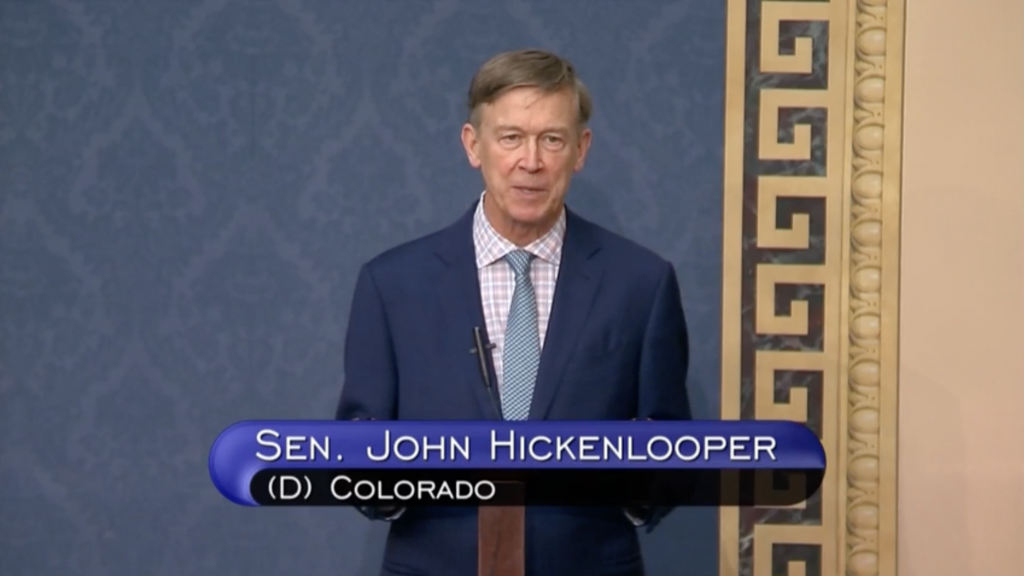“This is the beginning of the end of Americans getting the short end of the stick from pharmaceutical companies peddling prescription drugs.”
WASHINGTON – U.S. Senator John Hickenlooper spoke on the Senate floor yesterday to emphasize the impact of Medicare’s new ability to negotiate with pharmaceutical companies to lower drug prices. Thanks to the Inflation Reduction Act, which the Senate passed in August 2022, Medicare is now able to negotiate prescription drug prices for the first time ever. Medicare recently announced the first ten drugs they will negotiate.
For a full video of Hickenlooper’s remarks, click HERE
“For years, we’ve all been paying much more than those in other countries pay for the same drugs. But now, Medicare is taking the first step towards ending that stranglehold on life-saving drugs,” Hickenlooper said on the Senate floor.
“The Bottom Line: seniors on Medicare are getting ripped off. And going forward they are finally going to spend less on the prescription drugs that they need, in many cases, just to stay alive.”

To download full video of Hickenlooper’s remarks, click HERE. A full transcript of his remarks is available below:
“Well, this is the beginning of the end for Americans getting the short end of the stick from pharmaceutical companies peddling prescription drugs. For years, we’ve all been paying much more than those in other countries pay for the same drugs. But now, Medicare is taking the first step towards ending that stranglehold on life-saving drugs.
Let’s be clear: this is not some unfair assault on global drug companies. Rather, this is a transition that’s going to give Americans the same opportunity to afford life-saving drugs as other countries are given.
According to the Kaiser Family Foundation the U.S. spends far more than any other industrialized country for prescription drugs.
From getting charged $150 more for Xarelto – which reduces the risk of coronary artery disease – to getting ripped off by paying $1,600 for Enbrel, an arthritis drug.
Eliquis, a very common blood-thinner, and one that I have occasionally used myself, prevents blood clots, but costs an extra $514 out-of-pocket for Medicare enrollees in Colorado; in Germany it’s only $96, it’s five times more in the United States.
Why should we pay more than Germans, and Canadians, and the Swiss? What possible rules of common sense should permit drug companies the right to charge us many times more than what the rest of the world pays for the same drugs?
Part of the answer is that up until now, we’ve let them. Medicare, the largest buyer of prescription drugs in the United States, has never been allowed to negotiate the price of drugs with pharmaceutical companies. As Senator Wyden was making painfully clear, the losses to the American people have been substantial.
Until now, Medicare has had to accept whatever price big pharma dictated, even when Medicare knew we were subsidizing the rest of the world.
Well, that changes today. Thanks to the Inflation Reduction Act we passed last year, Medicare finally has the ability to negotiate with Big Pharma and get us a fair price for these drugs.
Medicare will take the 10 most expensive drugs each year and negotiate their prices down. But the impact goes far beyond the impact just on seniors, or just for those 10 drugs.
First, every year, every year, Medicare will negotiate down 10 more drugs, so the cost will keep coming down each year. In future years, Medicare will be able to negotiate even more drugs.
Second, because Medicare is the largest buyer in the American market, there’s a darn good chance that other big buyers, like private insurance companies, are going to negotiate to bring the price that they pay down to what Medicare will pay. A falling tide lowers all prices.
So, what exactly does that mean now? Medicare has announced the first drugs it will negotiate. They include the two I’ve mentioned – Xarelto and Enbrel – along with eight others.
Four of the drugs treat diabetes, the others treat or prevent blood clots, heart failure, kidney disease, blood cancers, and arthritis.
In 2022, Medicare enrollees taking these 10 drugs paid $3.4 billion in out-of-pocket costs. That’s what they paid out of their own savings.
The average per enrollee cost was a staggering $5,247 for the most expensive drug on the list, Imbruvica – which treats blood cancer.
It’s a big deal in every state, it’s a big deal in my home state of Colorado. Over 100,000 Medicare enrollees in Colorado take these 10 drugs.
43,000, including me, take Eliquis, this is a blood-thinner to help prevent blood clots with an average out-of-pocket cost of over $500.
21,000 take Xarelto and pay $447 on average out-of-pocket cost.
The Bottom Line: seniors on Medicare are getting ripped off. And going forward they are finally going to spend less on the prescription drugs that they need, in many cases, just to stay alive.
And if all goes according to plan, the rest of us will also pay less once insurance companies follow Medicare’s lead.
Now this isn’t a fix to all of the problems in the health care system in this country. But it’s a pretty big step. And it’s a reminder that we’re not helpless to fix the other problems we face that are still out there. All it takes is the will to come together and get things done.
Hopefully, this is just the beginning.”
###
